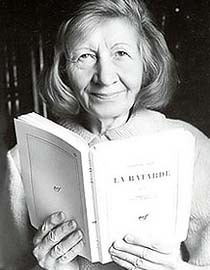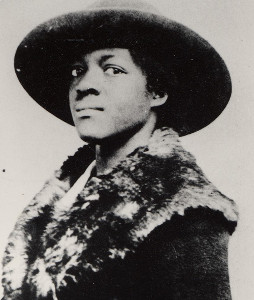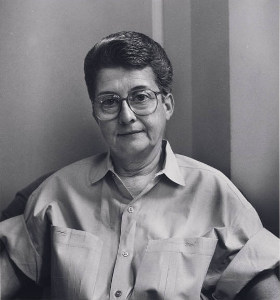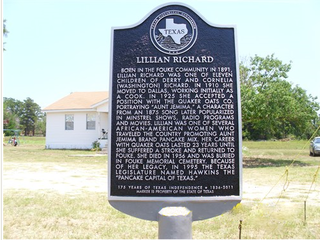
Frances Ruth Shand Kydd was the mother of Diana, Princess of Wales. She was the maternal grandmother of William, Prince of Wales and Prince Harry, Duke of Sussex, respectively first and fifth in the line of succession to the British throne. Following her divorce from Viscount Althorp in 1969, and Diana's death in 1997, Shand Kydd devoted the final years of her life to Catholic charity work following her conversion to Catholicism.

Curve is a global lesbian media project. It covers news, politics, social issues, and includes celebrity interviews and stories on entertainment, pop culture, style, and travel.

Violette Leduc was a French writer.

Jill Johnston was a British-born American feminist author and cultural critic. She is most famous for her radical lesbian feminism book, Lesbian Nation and was a longtime writer for The Village Voice. She was also a leader of the lesbian separatist movement of the 1970s. Johnston also wrote under the pen name F. J. Crowe.

Gracie Hall Roosevelt was an American engineer, banker, soldier, and municipal official who was the youngest brother of First Lady of the United States Eleanor Roosevelt and a nephew of President Theodore Roosevelt.
Dorothy Baker was an American novelist who wrote the lesbian pulp novel Trio (1943), along with widely-successful romance novels. She married poet Howard Baker and together they composed fiction and plays.
Anita Cornwell was an American lesbian feminist author. In 1983, she wrote the first collection of essays by an African-American lesbian, Black Lesbian in White America.

A gay icon is a public figure who is regarded as a cultural icon by members of the LGBT community. Such figures usually have a devoted LGBT fanbase and act as allies to the LGBT community, often through their work, or they have been "openly appreciative of their gay fanbase". Many gay icons also have a camp aesthetic style, which is part of their appeal to LGBT individuals.

Lesbian literature is a subgenre of literature addressing lesbian themes. It includes poetry, plays, fiction addressing lesbian characters, and non-fiction about lesbian-interest topics. A similar term is sapphic literature, encompassing works that feature love between women that are not necessarily lesbian.

Mabel Hampton was an American lesbian activist, a dancer during the Harlem Renaissance, and a volunteer for both Black and lesbian/gay organizations. She was a significant contributor to the Lesbian Herstory Archives.

Barbara Grier was an American writer and publisher. She is credited for having built the lesbian book industry. After editing The Ladder magazine, published by the lesbian civil rights group Daughters of Bilitis, she co-founded a lesbian book-publishing company Naiad Press, which achieved publicity and became the world's largest publisher of lesbian books. She built a major collection of lesbian literature, catalogued with detailed indexing of topics.
Gale Wilhelm was an American writer most noted for two books that featured lesbian themes written in the 1930s: We Too Are Drifting and Torchlight to Valhalla.
Maude Hutchins was an American artist, sculptor, and novelist from New York.

Laura Aguilar was an American photographer. She was born with auditory dyslexia and attributed her start in photography to her brother, who showed her how to develop in dark rooms. She was mostly self-taught, although she took some photography courses at East Los Angeles College, where her second solo exhibition, Laura Aguilar: Show and Tell, was held. Aguilar used visual art to bring forth marginalized identities, especially within the LA Queer scene and Latinx communities. Before the term Intersectionality was used commonly, Aguilar captured the largely invisible identities of large bodied, queer, working-class, brown people in the form of portraits. Often using her naked body as a subject, she used photography to empower herself and her inner struggles to reclaim her own identity as "Laura" – a lesbian, fat, disabled, and brown person. Although work on Chicana/os is limited, Aguilar has become an essential figure in Chicano art history and is often regarded as an early "pioneer of intersectional feminism" for her outright and uncensored work. Some of her most well-known works are Three Eagles Flying, The Plush Pony Series, and Nature Self Portraits. Aguilar has been noted for her collaboration with cultural scholars such as Yvonne Yarbo-Berjano and receiving inspiration from other artists like Judy Dater. She was well known for her portraits, mostly of herself, and also focused upon people in marginalized communities, including LGBT and Latino subjects, self-love, and social stigma of obesity.

Lillian Richard was an African-American actress best known for portraying Aunt Jemima.
Almeda Sperry (1879–1957) was an American anarchist, political activist, and former prostitute. She is known for the passionate love letters she wrote to fellow anarchist Emma Goldman. The letters allude to past sexual encounters between the two women, although the extent to which Goldman may have reciprocated the romantic feelings expressed by Sperry is unknown.
The following is a timeline of lesbian, gay, bisexual, transgender and queer (LGBTQ) journalism history.
Diana Rivers is an American writer, artist, and activist. She is the author of the Hadra book series and recognized as a pioneer of women-only spaces in Arkansas. Rivers is an advocate for LGBT rights, peace, racial equality, social justice, and ecology.

Ruth Fuller Field, also known by her pen name Mary Casal, was an American writer known for writing The Stone Wall, the first known autobiography of a lesbian woman in the United States.












